
How to Find the Right Networking Events for You
Watch this video to make sure you're attending the right ones for you:




It's an honor to be named valedictorian. Thrilling... Exciting... Right up until the moment you realize you have to give the speech, that is.
Then the panic sets in.
What should I say?
How long should this be?
Will anyone even remember it?
No problem. With some preparation and practice, you'll be ready to deliver a powerful speech on your graduation day.
1. Decide on a theme. Give a speech that has one main point, and stick to it. That theme can be anything that you want the audience to remember overall.
2. Know your audience. Your speech needs to speak to the people in the room. Who are they? What do they need to hear? Is there something specific to your graduating class you want to talk about?
3. Craft an outline. An outline will keep you on track so you don't go off on tangents or start rambling. This is not a script, however. No one wants you to read to them.
4. Keep it short. Check with your school administrator to find out how long they want you to talk, and don't go any longer. Short and sweet is the way to go when it comes to graduation speeches.
5. Put your most important message at the end. Your audience is most likely to remember what you say last, so make the most of your final minutes behind the podium.
Your stage presence matters, and so does how you practice. Click on this guide for tips (it's free, and you don't have to give us your email address to get it):
Need additional help? Email me (Carrie Sharpe) at info@ryancarriesharpe.com, and let's talk about your speech!


What could that one thing be?
It's vital that a speaker establishes credibility, but this one thing can kill it in an instant. Watch as I describe what that one thing is and what you should do instead to boost your credibility as a speaker:
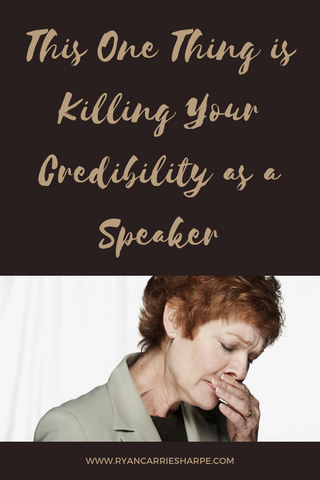
Learn more about credibility in our Speaking Society. Click here to join!

Personal credibility.
That's a tough topic, but it's so important. There have been times when I've been asked to refer a speaker for a particular event. You know what's sad? When a speaker would be perfect for that event but I can't recommend him/her because of their personal credibility issues.
If a speaker is known for arriving late to a speaking event, there's a personal credibility issue (please don't misunderstand-- an emergency or one-time issue is NOT what I'm talking about... I'm talking about someone who is habitually late).
If a speaker makes unreasonable demands and becomes known as a diva, there is a personal credibility issue.
If a speaker backs out of a speaking contract/agreement simply because he no longer feels like going to the event, there's a personal credibility issue.
If a speaker shows up to an event wearing inappropriate clothing choices for that event, there's a personal credibility issue (I've truly seen it all).
If a speaker flirts with members of the event committee, there is a personal credibility issue (yes, I've seen this happen, and it's not pretty).
The point here is to be a professional in every sense of the word. Your credibility is at stake. Future speaking opportunities are at stake. Your reputation is at stake. Referrals and recommendations are at stake.
Today make a personal list of things you can improve in regards to your personal credibility. You don't need to share it with anyone, but please reflect and be honest with yourself. Once you've done this, take action on that list!
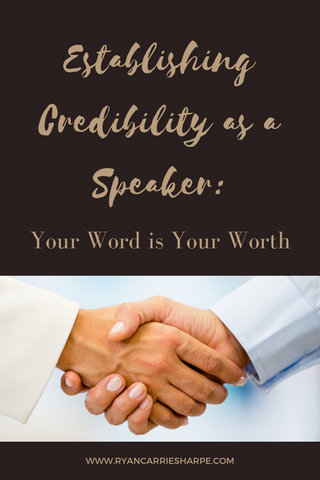
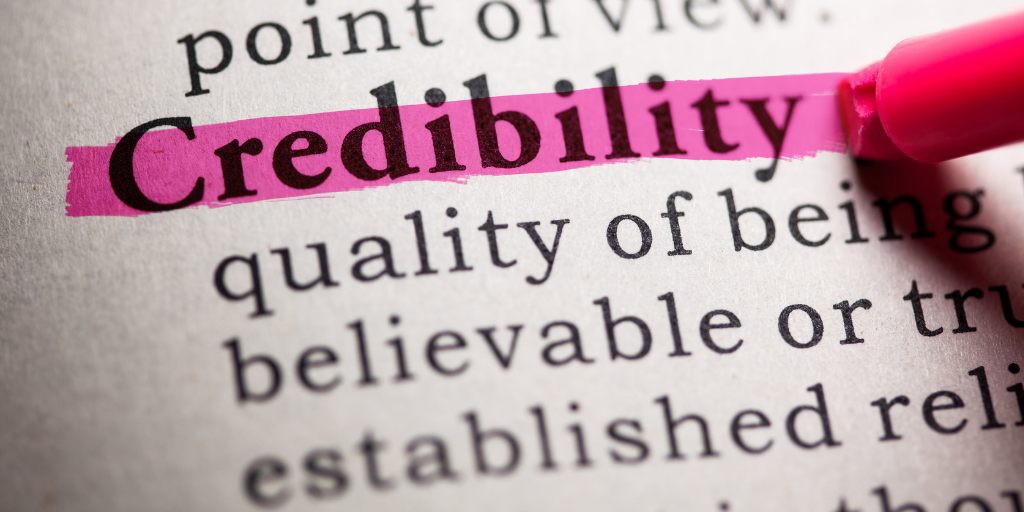
If you want to be seen as an expert in the field you're speaking about, you need credibility.
That doesn't mean you need to have 500 speaking gigs under your belt. It means that you are seen as credible as an expert in your field. Even a brand new speaker can establish credibility as an expert.
One way to build credibility is through testimonials. You can post them on your website and one-sheet, and you can provide them to event planners. The best testimonials are a few short sentences describing the transformation you inspired in an audience, your integrity as a person and professional, and/or your knowledge of your subject matter.
1. Those given by people who have heard you speak (and can attest to your life-changing message)
2. Those given by people who have hired you to speak (and can shout from the rooftops how easy you are to work with and how you delivered more than they ever dreamed), and
3. Those given by people who have worked with you in some capacity and know first-hand how brilliant you are (if you're a brain surgeon, a testimonial from another surgeon who knows how skilled you are may be more important than a testimonial from someone who has heard you speak before).
Do you have testimonials that help establish your credibility? If so, post one on your social media channels today and tag us so we see it (we are "He says, She says" on all social media channels). If you don't have one, today's the day to get one (or more). Reach out to someone and ask for one. If you need help, send us an email at info@ryancarriesharpe.com and we'll help you brainstorm.
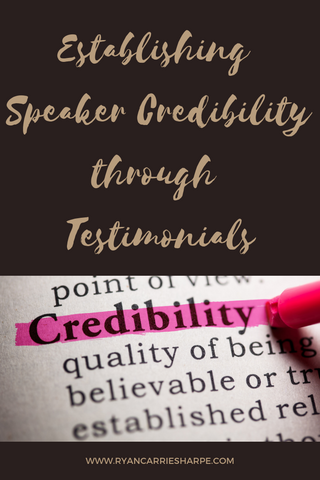
Looking for a supportive community where you can learn more about public speaking and other communication topics? You're invited to join us over in our Speaking Society. Click here to join.
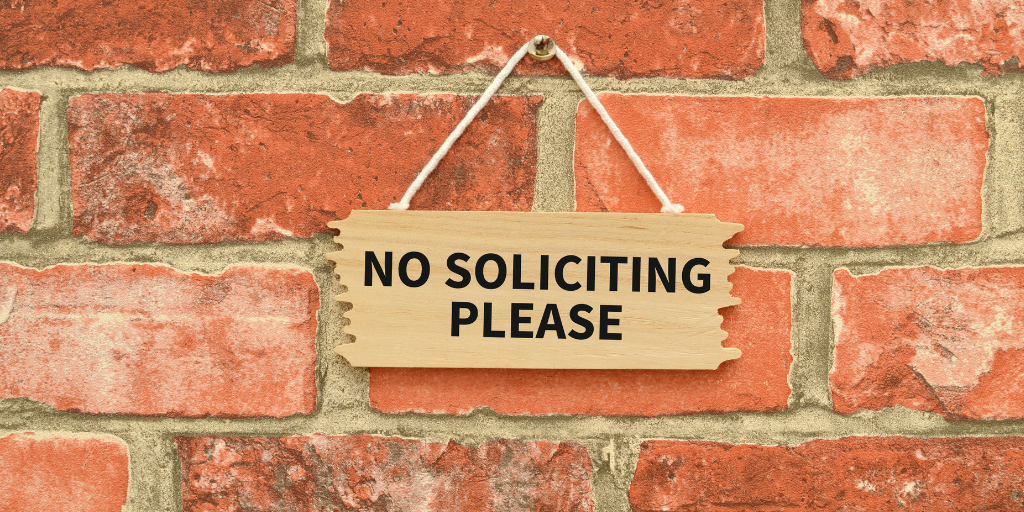
You go to your local networking event. While you're there you pass out 65 business cards, stumble through a few brief conversations about the awful weather, sample the food and wine, and then go home to wait for sales to pour in.
That's networking. Right?
Wrong.
A misunderstanding of networking's purpose causes frustration for so many business owners and professionals. That's because, for whatever reason, we've come to think of networking as selling. Then we're disappointed when it doesn't happen.
But networking does not equal selling.
Networking may, in fact, lead to sales at some point, but networking itself is not selling. No one goes to networking events with their wallet wide open, ready to throw money at you. That's not networking.
Rather, networking is building relationships. Plain and simple.
The goal of networking is to make connections and cultivate a community that becomes your professional network. Your network becomes your team of people to tap into when you have a question about something, want to refer someone, require a listening ear, or need a collaboration partner. Your network is your community of friends.
With any friendship, you must spend time together. Ask questions. Get to know each other. Care enough to be thoughtful and courteous. Learn more about each other's family members, struggles, and businesses. Follow up and stay in touch.
Be in it for the long haul. Networking is not a one-and-done event. Networking is a courtship.
1. Use good eye contact. Put your phone down, and look the other person directly in the eyes. Give all of your attention to that person without distraction.
2. Ask questions. Your objective is to learn about the other person, so ask things like "What do you do?" and "How did you get started doing that?"
3. Listen. Listen more than you talk. Listening shows that you care, and you don't want to miss any important details that are being shared!
4. Follow up. Get the other person's contact information so you can continue the conversation later. Send articles that are of interest to the other person, tag them on relevant Facebook posts, and meet up again at a later date.
5. Brainstorm collaborations. Someone whose work complements yours is a perfect collaboration partner. Find ways the two of you can team up on a future project.
Always remember that the goal of networking is to build relationships. Networking does not equal selling. Connect with people, learn more about them, and continue the conversations, and you'll create a community to support you for years to come.
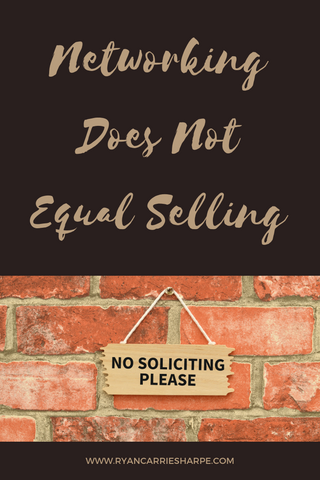
Looking for a supportive community where you can learn more about networking and other communication topics? You're invited to join us over in our Speaking Society. Click here to join.

At the end of each year (or anytime, really!) it's important to evaluate how you're doing as a speaker. As speakers, we focus so much on speaking that we sometimes forget to pay attention to the business side of things. Knowing your numbers and developing smart strategies are vital to your success as a speaker, especially if you'd like to make money at it.
Have you taken time to evaluate how things are going for you as a speaker and communicator? Are you setting, and achieving, your goals? It's time to evaluate.
1. Do I have a speech (keynote or workshop) that I'm proud of and can get hired to deliver? (If not, what needs to happen to get to that point?)
2. Do I have a money-making strategy for my talks in addition to speaker fees? (If not, what can be planned to ensure profits from speaking gigs?)
3. Do I have a plan for getting hired to speak in the next 12-18 months? (If not, the time is now.)
4. Have I done all the behind-the-scenes prep work for pitching myself? (One-sheet, website speaker page, listings with bureaus, networking, researching conferences, etc.)
5. What other types of speaking do I need to plan for the next 12 months? (Facebook Live, podcasts, radio/TV interviews, teaching classes, online workshops/webinars, etc.)
6. When I speak, am I truly connecting?
7. Am I building that know-like-trust factor and long-term relationships with my audience?
Grab some paper and a pen. Spend some time today working through that list so you're all set for the next year or so. It's important to analyze how things are going before making plans for the future.
Need help working through your ideas and plans? Need to improve your speech or stage presence? Click here to schedule a call with Carrie to learn more about how she can help you achieve your goals!
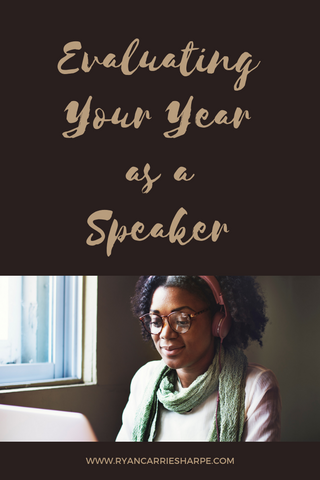

Our Speaker Spotlight series puts the focus on speakers in our community. Iron sharpens iron, and we can all learn from the experiences of others. We asked questions and our speakers answered them. These answers come from Sarah Humes.
I will talk to anyone who will listen! But, truly, I have a heart for Moms! I love inspiring the mom who just needs to hear that they can make it through another day! If that mom has been feeling overwhelmed, overworked, or uninspired, even better! I want a chance to change that!
I often reach my audiences at first by talking about decluttering. I thinking getting rid of excess things is incredibly brave, and a huge mindset shift. But, my speaking is so much more than that. I love to speak about anything relational, since I am such a people person! I think hospitality, parenting, marriage, friendships, core values and conflict resolution are some of the bravest things I talk about! And, I love sharing how God has redeemed a very scared and broken woman and transformed her into a brave, inspirational and bold business owner!
I am funny and conversational. I deal with a lot of heavy issues in my speaking. Talking about feeling trapped in my home with agoraphobia, losing my sister(s) to death, and being chronically depressed and filled with anxiety is not easy. But---God through it all-- some how gave me this amazing sense of humor. I feel that has been a great tool in recovery, and it's an amazing tool in connecting to my audience. I actually had a couple brief stints in stand up comedy early on. But, I knew that, even though I loved being funny, I wanted my speaking to have a deeper message, too.
I love imagining speaking to a room of 1000+ people. I can envision making them laugh and they are all having to hold their sides. Yet, my message is so powerful that they will remember key points for years after. That is the kind of speaker I dream to be.
Not too long ago, I was hired at a local library. It is the tiniest library you have ever seen! (Imagine a tiny house...It's the size of one of those, maybe even smaller! There is not even a bathroom there!) It is in a very rural location. In the middle of my speech (to 8 people!) I suddenly hear a very loud duck quacking. I jumped, and began searching for the duck. I quickly learned that the "duck" was actually the librarian's ringtone, but she had to leave her phone on for her children. The kids then proceeded to text her about 10 more times that night. It proved to be quite comical, and I began to ask the duck to comment on many of my points that evening. Humor is always my friend!
I remind myself that my message is much more important than how nervous I feel.
To be authentic, have fun, and make a point to interact with my audience.
To speak at the Boss Mom Retreat, to be interviewed on the Today Show, to make enough money to buy a safer house for my family (our house is lovely, but old and has a wet basement) and to inspire people not just locally, but nationally and globally too! I have big dreams, but I am a go-getter! I have already overcome so much, so what is a few more obstacles?
My name is Sarah Rose Humes. For years I have struggled with overcoming anxiety and fear. And, I believed lies about myself. Somewhere along the line, I was fed the line I was weak because I was afraid. The truth-- I was strong because I fought back. Every single day, I used the word of God, prayer, encouragement from friend and family, and personal grit to fight against the (huge) list of things that scared me.
In-Courage Living was born out of the desire to share my experiences with others to help them realize they they too are strong. So many times we let fear hold us back from living our best life. I want everyone to live AMAZING days! I have found that the more I embrace my struggle as a blessing to grow, the richer my life has become.
Over the past 5 years, I have taught small audiences and groups many different life skills to deal with life's little problems. Now, as I branch out, I would like to include you and your group! I specialize in overcoming fear, intentional parenthood, de-cluttering, and using the Bible as a practical everyday tool for living. I have even taught small sessions on meal prepping and goal planning.
Website: https://www.sarahrosehumes.com
Facebook: https://www.facebook.com/incourageliving
Facebook Group: https://www.facebook.com/groups/InCourageLiving
Instagram: https://www.instagram.com/humessarah
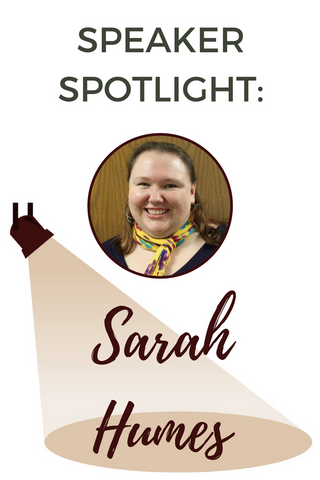

Slides during a speech are a huge pet peeve of mine. They are almost always misused, unneeded, and/or distracting. Slides should be used to enhance the message of the speech, but they are usually just a crutch for the speaker.
Before using a slide, ask yourself this question:
If it does, use the slide. If it doesn't, get rid of the slide. It's as simple as that. Every single slide should make the speech better in some way. If it doesn't, it should be eliminated.
Slides should not be used as notes for the speaker. That's a crutch, and those slides don't add anything useful to the speech. Tech glitches occasionally occur, and if you're relying on those slides to get you through your speech you will be up a creek without a paddle.
Slides should not be full of text, especially in tiny font. That's annoying and unnecessary. Your audience should not spend all their time reading while you're talking. When slides become overwhelming, and when there are far too many, that's called Death By PowerPoint. Don't do that.
The focus, as a speaker, should be you and your message.
The focus should not be the slides.
If you must use slides, be sure to ask yourself the question above. If you determine you need slides, follow these guidelines:
Less is more. Keep slides to a minimum. Every moment of your speech does not need its own slide. Allow your audience to determine what's important from your speech and take their own notes without the distraction of endless slides.
Consider hand-outs as an alternative. If you have a lot of worksheet-style content that you're tempted to put on slides, hand-outs may be a better option. You can give them out after your talk, which allows your audience to simply listen and learn while you're talking. Audience members can review your information later.
Bigger is better. If you must use text, make it super huge. Everyone in the room needs to see it. Use few words in large font. Don't clog up your slides with book-length paragraphs in tiny font.
Tell a story. Use your slides to help illustrate your message. Images are preferable to text. Use meaningful images rather than stock photos. If an image doesn't have special meaning, don't use it.
Stay on target. Only use slides that don't distract from you and your message. If your audience is looking up at the screen behind you more than they're looking at you, that's a problem.
The best slides I've ever seen showed important statistics in a huge graph for effect, screenshots that illustrate how to implement what's being taught, or personal photos of the speaker's topic. They told the message better than the speakers could, so they made sense and actually enhanced the speeches. Use your slides in similar ways, and your speeches will be powerful and make an impact as well.
Need to improve your speech or stage presence? Click here to schedule a call with Carrie to learn more about how she can help you achieve your goals!

Our Speaker Spotlight series puts the focus on speakers in our community. Iron sharpens iron, and we can all learn from the experiences of others. We asked questions and our speakers answered them. These answers come from Sasha Gray.
I am a motivational humorist that resonates with women who need that confidence boost or online business owners that need to understand how Facebook can help their business.
I love seeing eyes light up when I show online business owners how to make a small change on their FB page that will make a difference in the reach of their posts.
I love seeing eyes light up when I talk to women about self confidence, and how to break out of the habits that keep them from living a life they love.
I'm 'real'. What on Earth does that mean...are others an illusion?
I'm down to earth and have 'been there, done that' and speak to the heart of my audience, resonating with those that are struggling to find the journey they're supposed to take.
I would love to be on the stage of a giant conference, speaking to thousands of business owners or women that are looking for the self confidence they've misplaced, with enthusiasm that is tangible in the room, and music encouraging the occasional dance party.
I did an entire Scattered Sasha Show (1 hour) with a stink bug snugly stuck in my hair.
I didn't even NOTICE it so I did NOTHING.....
However, when I've had my daughter interrupt my show, my dog begin barking, or people show up to my door unannounced. I just go with the flow....It's all life and my real life is what my audience seems to love, so it's all good.
Honestly, I LOVE speaking and don't recall ever having a case of the 'nerves'. I feel very fortunate because I know public speaking is one of the top fears people have. I'm almost always ready to jump up on stage (real or imagined) and start talking!
Be Yourself!
I want to connect people to each other, I want to connect with them and I want them to feel as if they are a better version of themselves after hearing my speech.
I'm Sasha, and I hang out over at Scattered Sasha, where I offer motivational antidotes, laugh-out-loud funny stories, a touch of sarcasm and a whole lotta sass. So when people ask me that elusive question of 'what do you do?', my answer usually runs along these lines:
"I'm a motivational humorist that runs on caffeine, chaos and cuss words and my life has been slapped together by pixie dust and tequila."
But all that makes one heck of a story....and I love to tell that story, along with a lot of other stories, as often as I can.
And my goal is always the same: to make you laugh, encourage your journey, and lift you up so you can fly on glitter covered wings.
Website: www.scatteredsasha.com
Facebook: www.facebook.com/scatteredsasha